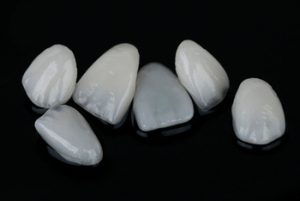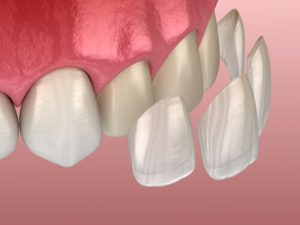In today’s world, where a smile speaks volumes before a word is uttered, the quest for perfect teeth has led many to the doorstep of cosmetic dentistry, specifically to a dentist for veneers. This service is more than just a dental treatment; it’s a pathway to enhanced confidence and radiant smiles. In this detailed blog, we will explore everything you need to know about dental veneers, covering their types, procedures, benefits, and costs, ensuring you are well informed to make the right decision for your dental health.
Understanding Dental Veneers
Dental veneers, also named dental porcelain laminates or simply veneers, are wafer-thin, custom-made shells crafted from tooth-coloured materials designed to mask the front surface of teeth to improve your appearance. These shells are merged with the front of the teeth, changing their colour, structure, size, or length. Veneers can be crafted from porcelain or composite resin, and each material boasts advantages.
Porcelain Veneers
 Porcelain veneers are widely celebrated for their ability to replicate the properties of natural teeth, primarily because of their light-reflecting qualities. They protect from stains better than resin veneers and better replicate the light-reflecting properties of natural teeth. Porcelain veneers are usually crafted in a dental lab and require a dental professional to intricately adjust their shape to fit the patient’s existing teeth seamlessly.
Porcelain veneers are widely celebrated for their ability to replicate the properties of natural teeth, primarily because of their light-reflecting qualities. They protect from stains better than resin veneers and better replicate the light-reflecting properties of natural teeth. Porcelain veneers are usually crafted in a dental lab and require a dental professional to intricately adjust their shape to fit the patient’s existing teeth seamlessly.
Composite Resin Veneers
Alternatively, composite resin veneers are made from a tooth-coloured filling material that can be colour-matched to your natural teeth. These veneers require less tooth enamel removal than their porcelain counterparts and are generally easier to fix if damaged. Composite veneers can often be finalised in one dental visit, making them a quicker, though less durable, option.
How to Choose the Right Dentist For Veneers?
When considering dental veneers as a solution for enhancing your smile—whether to address discoloured teeth, crooked teeth, or other aesthetic concerns—it’s crucial to select the right dentist. This decision can majorly impact the success of your treatment, the longevity of your veneers, and your overall satisfaction. Here, we will guide you through the essential aspects to consider when choosing a professional for your porcelain or composite veneers.
Qualification in Cosmetic Dentistry
Cosmetic dentistry is an art form combined with scientific knowledge. A dentist expert in cosmetic procedures, such as porcelain and composite veneers, will have a deeper understanding and more refined skills than a general dentist. When researching potential dentists, look for those who highlight cosmetic dentistry as a core component of their practice. Check their qualifications to see if they have undertaken specific training in cosmetic procedures and are members of professional bodies like the Australian Dental Association (ADA) or the American Academy of Cosmetic Dentistry (AACD).
Experience and Expertise
The experience of a dentist is often reflected in the quality of their work. Ask how long they have been practising and how many years they’ve worked with dental veneers. Inquire about the types of veneers they typically use—porcelain veneers, composite resin veneers, or both—and their reasoning for choosing one over the other in specific circumstances.
Moreover, an experienced dentist should be able to provide before and after photos of actual patients who have undergone the veneer procedure. This visual evidence can give you a clear idea of the results you might expect and the dentist’s skill level in creating natural-looking, aesthetically pleasing smiles.
Consultation Process
An effective consultation process is a cornerstone of successful cosmetic dentistry. During your initial consultation, a skilled dentist will examine the health of your existing teeth and gums to ensure you are an ideal candidate for veneers. They should discuss your aesthetic goals, examine your tooth enamel, and consider any issues like tooth decay or gum disease that might need addressing before veneer placement.
The consultation should also involve discussing the types of veneers available—such as the differences between porcelain veneers and composite veneers—their respective benefits, longevity, and costs. Be wary of dentists who push for more expensive options without sufficient explanation or fail to offer alternatives like temporary dental veneers, which can be used to trial the look before committing to permanent veneers.
Technology and Techniques
Advanced technology in cosmetic dentistry can significantly enhance the outcome of dental treatments. Check if the dentist uses modern techniques and equipment, such as digital smile design, 3D imaging, and CAD/CAM technology, allowing greater precision in veneer fabrication and fit.
Furthermore, inquire about the techniques used to prepare and fit veneers. For instance, some dentists may offer minimal prep or no-prep veneers that need little to no removal of tooth enamel, preserving more of your natural tooth structure. These details can affect both the process and the health of your teeth post-procedure.
Patient Reviews and Testimonials
 Patient testimonials and reviews can provide insights into the dentist’s reliability, professionalism, and previous clients’ satisfaction levels. Look for reviews that specifically mention veneers. Pay attention to comments about the patients’ experiences during the procedure, the follow-up care, and how the dental office handled issues.
Patient testimonials and reviews can provide insights into the dentist’s reliability, professionalism, and previous clients’ satisfaction levels. Look for reviews that specifically mention veneers. Pay attention to comments about the patients’ experiences during the procedure, the follow-up care, and how the dental office handled issues.
Aftercare and Follow-up
Good dental practices will offer comprehensive aftercare advice and encourage follow-up appointments to monitor the veneers and the health of your gums and teeth. During your initial consultation, ask about the type of aftercare provided and the policies regarding repairing or replacing veneers should complications arise.
Personal Comfort
Finally, your comfort with the dentist is incredibly important. During your interactions, assess whether you feel listened to and respected. A good cosmetic dentist should be patient, approachable, and willing to answer all your questions. They should make you feel confident in your decision and comfortable with the procedures you are considering.
The Dental Veneers Procedure
The process of getting dental veneers is meticulous and involves several key steps designed to ensure the best fit and appearance. Understanding this procedure can help decrease anxiety about the treatment and prepare you for what to expect when you decide to enhance your smile with veneers. Here’s a detailed walkthrough of the dental veneer procedure, emphasising the role and benefits of temporary veneers.
Initial Consultation and Planning
The first step in the veneer process is a comprehensive consultation with your dentist. During this session, your dentist will assess the health of your teeth and gums to find out if you are a suitable candidate for veneers. This evaluation typically involves dental X-rays and impressions of your teeth. Your dentist will also discuss your cosmetic goals, the shape and colour of the veneers, and whether you will need porcelain or composite veneers. This planning stage is crucial for customising the veneers to fit your dental structure and aesthetic preferences.
Tooth Preparation
To prepare your teeth for veneers, a minute amount of enamel must be removed from the front surface of each tooth receiving a veneer. This process is essential to ensure the veneers fit seamlessly and do not look bulky. The amount of enamel removed is less, usually less than a millimetre. This step may involve local anaesthesia to minimise any discomfort.
Taking the Impression
Once your teeth are prepared, your dentist will take an impression of your newly shaped teeth. This impression could be traditional, using dental putty or a digital scan of your teeth. It is then transferred to a dental lab, where your custom veneers are created. The precision with which this impression is taken is critical for the final veneers’ accurate fit and natural look.
Fitting of Temporary Veneers
While your permanent veneers are being crafted—a process that can take a few weeks—temporary veneers are often placed. These temporary veneers serve several important functions:
Protection: They protect the exposed enamel prepared for the final veneers, preventing sensitivity and decay.
Aesthetics: Temporary veneers allow you to maintain a normal appearance, so you won’t have to worry about an unsightly smile while you wait for your permanent veneers.
Functionality: They let you eat and speak without discomfort.
Trial Run: Temporary veneers give you a preview of your new smile, offering the opportunity for any last-minute adjustments in shape or colour before the final veneers are fabricated.
Bonding of Permanent Veneers
Once your permanent veneers are finalised, your dentist will remove the temporary veneers and adjust the new ones on your teeth to check their fit and colour. Any necessary adjustments are made at this stage. After ensuring a perfect fit and match, the teeth are cleaned, polished, and etched to prepare them for bonding. An adhesive is then applied to the veneers, which are carefully positioned on your teeth. A curing light quickly hardens the adhesive, securing the veneers in place.
Evaluation and Follow-up
The final step involves a thorough evaluation by your dentist to ensure the veneers are comfortably placed and that your bite is correct. Your dentist will also provide care directions to help you maintain your veneers, including proper brushing, flossing, and regular check-ups. Follow-up appointments are essential to monitor the veneers and make any necessary adjustments.
Benefits of Veneers
Dental veneers, whether porcelain or composite, offer numerous benefits beyond mere aesthetics. They can significantly enhance your teeth’ overall health and functionality while also providing a solution to various dental issues. Here’s a detailed look at how veneers can benefit your dental health and appearance:
Enhancement of Tooth Appearance and Confidence
The primary benefit of veneers, whether porcelain veneer or composite veneer, is their ability to transform discoloured, chipped, or misaligned teeth into a bright, well-aligned smile. Veneers are meticulously curated to cover the front surface of your teeth, improving colour, shape, and overall appearance. This transformation can dramatically boost your self-confidence, making you more willing to smile and engage socially.
Durability and Protection
Porcelain veneers are highly durable and resistant to coffee, tea, or tobacco stains. While slightly less durable than porcelain, composite veneers offer a resilient surface that withstands everyday wear and tear. Both veneers act as a protective shell for teeth, shielding them from further damage or decay. This is especially beneficial for those with thinning tooth enamel.
Maintenance of Healthy Teeth
Veneers can contribute to the overall health of your mouth. Covering areas of damage and decay, they help protect against further deterioration from exposure to bacteria and acids. Additionally, applying veneers typically requires minimal removal of the existing tooth structure compared to other dental restorations like crowns. This preservation of your natural tooth material helps maintain stronger, healthier teeth.
Solution for Teeth Grinding
Veneers can provide protection for patients who suffer from bruxism, commonly known as teeth grinding. While not a cure for the habit, the tough materials used in porcelain and composite veneers can resist the damage caused by grinding, which can otherwise lead to severe dental issues. Veneers can prevent further damage to the enamel and help maintain the structural integrity of the teeth.
Long-Term Dental Solution
Both porcelain and composite veneers offer long-term solutions for improving dental aesthetics. Porcelain veneers, in particular, can last up to 10 to 15 years with proper upkeep, while composite veneers can stay durable between 5 to 7 years. This makes them a significant but worthwhile investment for anyone looking to improve their smile permanently.
Customisation to Individual Needs
Veneers are highly customisable, which means they can be structured and coloured to match your natural teeth, providing a natural-looking enhancement to your smile. The ability to customise them helps ensure that they merge seamlessly with your existing teeth, enhancing the natural beauty of your smile without appearing out of place.
Minimal Recovery Time
Unlike more invasive dental procedures, installing dental veneers usually involves minimal post-procedural discomfort and short recovery time. Most patients can continue normal activities almost immediately after the procedure, with only minor adjustments needed while getting used to the feel of their new veneers.
Investing in dental veneers can be a transformative decision not just for your smile but also for your dental health and overall well-being. Whether you choose porcelain or composite veneers, the benefits are substantial. They provide not only aesthetic enhancement but also a functional safeguard for your teeth. With proper care and regular dental check-ups, veneers can be an enduring solution to various dental issues, contributing to a healthier, more confident smile.
Considerations and Costs
 Choosing the right type of veneer is crucial and depends on several factors, such as your dental health, the condition of your natural teeth, and your specific cosmetic needs. Porcelain veneers cost more than composite resin veneers, reflecting their durability and the intricate process required to craft them. Costs can vary widely based on geographic location, the expertise of the cosmetic dentist, and the specifics of the dental treatment needed.
Choosing the right type of veneer is crucial and depends on several factors, such as your dental health, the condition of your natural teeth, and your specific cosmetic needs. Porcelain veneers cost more than composite resin veneers, reflecting their durability and the intricate process required to craft them. Costs can vary widely based on geographic location, the expertise of the cosmetic dentist, and the specifics of the dental treatment needed.
Caring for Your Veneers
Maintaining dental veneers is simple and involves caring for them like your original teeth. Routine brushing and flossing, along with regular dental check-ups, are sufficient to maintain the health and appearance of your veneers. However, avoid using your veneers to bite into hard objects to prevent chipping.
Conclusion
Dental veneers offer a fantastic way to improve your smile and confidence. Whether you opt for porcelain or composite veneers, choosing a skilled cosmetic dentist who understands your needs and can deliver the smile you deserve is key to a successful outcome.
If you’re considering veneers and need expert advice tailored to your dental needs, don’t hesitate to contact Beyond Infinity Dental at (02) 8806 3799. Our dedicated team is ready to help you achieve the smile of your dreams with state-of-the-art solutions and compassionate care. Call today and take your first step towards a dazzling smile!
References:
https://www.medicalnewstoday.com/articles/dental-veneers
https://www.healthdirect.gov.au/veneers









